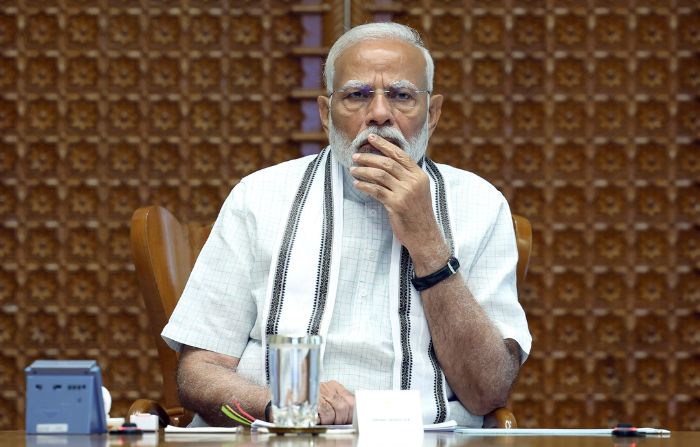- Friday, April 04, 2025
The Indian PM spoke about Hindu monk Swami Vivekananda, his spiritual journey and the future of India.

By: Shubham Ghosh
INDIAN prime minister Narendra Modi penned a long note after concluding his marathon 45-hour meditation at the Vivekananda Rock Memorial in Kanyakumari, lying at the southernmost tip of mainland India in the state of Tamil Nadu, on Saturday (1).
In his note, the PM reflected on his spiritual journey that started on May 30, when the campaigning for the final phase of the just concluded national election was completed, besides the election itself and the future of India. The final phase of the polling was held on June 1. The results will be announced on June 4.
At the Vivekananda Rock Memorial, Modi meditated at the Dhyan Mandapam, where famous Hindu monk Swami Vivekananda, whose original name was also Narendra, had meditated once and is believed to have had a divine vision about ‘Bharat Mata’ (Mother India).
Read: Modi in Kanyakumari for 2-day meditation; opposition say it violates poll conduct
In the note which he wrote to his countrymen while flying back from Kanyakumari to New Delhi and published in the Times of India, Modi said, “The biggest festival of democracy, the 2024 Lok Sabha Elections, are concluding today (June 1) in our nation, the Mother of Democracy. After a three-day spiritual journey in Kanniyakumari, I have just boarded the plane for Delhi. Through the day, Kashi and numerous other seats have been in the midst of voting. My mind is filled with so many experiences and emotions.”
Kashi is Varanasi from where Modi himself is contesting for the third time, after having picked big victories in the 2014 and 2019 general elections.
Read: PM Modi meditates in Kanyakumari after poll campaign ends; WATCH
Speaking about the meditation, the prime minister said he felt a “sense of detachment” within him and his mind “became completely detached from the external world”.
New Sankalps from the Sadhana in Kanniyakumari…penned a few thoughts which I am sharing. #NewSankalp4Bharat https://t.co/erT7FESRWN
— Narendra Modi (@narendramodi) June 3, 2024
“A sense of detachment came to grow within me…my mind became completely detached from the external world. Meditation becomes challenging amidst such huge responsibilities, but the land of Kanniyakumari and the inspiration of Swami Vivekananda made it effortless. As a candidate myself, I left my campaign in the hands of my beloved people of Kashi and came here. I am also grateful to God for instilling me with these values from birth which I have cherished and tried to live up to,” he wrote.
The PM added, “For thousands of years, Bharat has been moving forward with this sense of meaningful purpose. Bharat has been a cradle of ideas for thousands of years. We have never considered what we have acquired as our personal wealth or measured it purely by economic or material parameters. Therefore, ‘Idam-na-mama’ (this is not mine) has become an inherent and natural part of the character of Bharat.”
“Bharat’s welfare benefits our planet’s journey to progress as well. Take the freedom movement as an example. Bharat gained independence on August 15, 1947. At that time, many countries around the world were under colonial rule. Bharat’s independence journey inspired and empowered many of those countries to achieve their own freedom. That same spirit was seen decades later when the world came face to face with the once in a century COVID-19 pandemic. When concerns were raised about the poor and developing countries, Bharat’s successful efforts provided courage and assistance to many nations.
“Today, Bharat’s governance model has become an example for many countries around the world. Empowering 25 crore people to rise above poverty in just 10 years is unprecedented. Innovative practices such as Pro-People Good Governance, aspirational districts, and aspirational blocks are being discussed globally today.
“Our efforts, from empowering the poor to last-mile delivery, have inspired the world by prioritizing individuals standing at the last rung of society. Bharat’s Digital India campaign is now an example for the entire world, showing how we can use technology to empower the poor, bring transparency, and ensure their rights. Inexpensive data in Bharat is becoming a means of social equality by ensuring the reach of information and services to the poor. The whole world is witnessing and studying the democratization of technology, and major global institutions are advising many countries to adopt elements from our model.”
He also wrote, “Swami Vivekananda had said in 1897 that we must dedicate the next 50 years solely for the nation. Exactly 50 years after this call, Bharat gained independence in 1947.
“Today, we have the same golden opportunity. Let’s dedicate the next 25 years solely for the nation. Our efforts will create a strong foundation for the coming generations and the coming centuries, taking Bharat to new heights. Looking at the energy and enthusiasm of the country, I can say that the goal is not far away now. Let us take swift steps…let us come together and create a Viksit Bharat (developed India).”
Modi involved himself in a hectic campaign during the six-week election by attending more than 200 events, including rallies and roadshows in a month and half. He also gave several scores of interviews to various media platforms.
It is not the first time that the PM meditated during an election. He had done the same inside a holy cave in the Hindu shrine of Kedarnath in the Himalayan state of Uttarakhand during the 2019 elections.